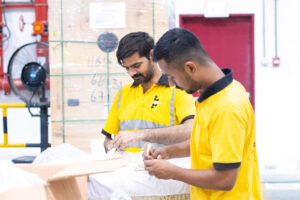
Shipping goods to the UAE involves navigating complex customs procedures that can sometimes lead to delays. Knowing the factors at play causing these delays is imperative for businesses involved in international trade.
• Understanding Customs Delays
• Factors Influencing Customs Delays
– Customs Clearance Process
– Incomplete Documentation or Documentation Errors>
– Import Restrictions and Regulations
– Customs Inspections
– Geopolitical Tensions
– Customs Duties and Taxes
– High Shipment Volume
• Ways to Avoid Customs Delays
• Navigate Customs Delay with TFI’s Licensed Customs Brokers
In this blog post, we’ll highlight the importance of recognizing the various factors contributing to customs delays. By gaining insight into these factors, you can take proactive measures to ensure smoother shipping processes. This approach not only saves time but also helps avoid potential disruptions, ensuring that goods reach their destinations promptly and efficiently.
Understanding Customs Delays
Customs delays are the extended waiting periods encountered during the international shipping process when goods undergo customs clearance. As goods traverse international borders, they must adhere to the customs regulations and protocols mandated by the receiving country. These regulations serve to enforce import laws, levy customs duties and taxes, and safeguard national security and public welfare.
Delays in customs transpire when hurdles or complexities arise during the customs clearance process, resulting in a prolonged waiting duration before the shipment is released and transported to its ultimate destination.
Factors Influencing Customs Delays
Customs clearance procedures encompass the essential steps and processes necessary for goods to legally enter a country. These procedures are crucially enforced by customs authorities to uphold import regulations, ensure the collection of customs duties and taxes, and verify the safety and compliance of imported goods.
The process typically initiates upon the arrival of goods at the destination country. Initially, shipping documents such as commercial invoices, packing lists, bills of lading or airway bill, and relevant permits or certificates are submitted for verification by customs officials. This initial step ensures that all documentation is accurate and complete.
Subsequently, customs inspections may be conducted where necessary. These inspections involve physically examining the goods to verify their description, quantity, and adherence to import regulations. The primary objectives of inspections include detecting prohibited or restricted items, confirming proper valuation, and assessing potential risks associated with the goods.
Following inspections, customs authorities calculate the applicable customs duties, taxes, and fees based on the declared value and classification of the goods. It’s the responsibility of the importer to settle these charges before the goods can be released.
Upon completion of all requirements, customs clearance is granted. This final step involves issuing a release order or customs declaration, signifying that the goods have met all regulatory obligations and can proceed to their intended destination within the country.
- Incorrect or inconsistent product descriptions.
- Inaccurate quantities or weights.
- Incomplete addresses or contact information.
- Discrepancies across different documents, such as invoices and packing lists.
- These errors can raise red flags with customs officials, prompting further scrutiny and delaying clearance as authorities seek clarification or corrections.
Furthermore, missing required permits, licenses, or certificates can also lead to customs delays. Certain goods, like pharmaceuticals, hazardous materials, or agricultural products, necessitate specific documentation to comply with import regulations. Failure to provide these essential documents can result in the shipment being held until the necessary paperwork is obtained and verified by customs authorities.
Import restrictions and regulations imposed by destination countries are significant factors contributing to customs delays during the clearance process. These regulations are established to safeguard public health, national security, environmental interests, and domestic industries. Non-compliance with these regulations can lead to delays or even the rejection of shipments.
The UAE enforces specific import controls on certain categories of goods such as live animals, plants, weapons, medicines, nuclear energy products, alcoholic drinks, cosmetics, wireless devices, and others. Importing such restricted items necessitates obtaining additional permits, licenses, or certifications from the dedicated controlling authority to demonstrate adherence to the regulations.
When a shipment includes goods subject to import restrictions, customs authorities require thorough documentation to assess compliance. This involves submitting the necessary permits or certificates for inspection and approval. Delays can occur during this review process as customs officials meticulously verify the documentation and ensure conformity with regulatory requirements. The length of the delay can vary depending on the complexity of the regulations and the time required to secure the mandated permits or certificates.
Customs inspections are a crucial component of the customs clearance process, significantly impacting the duration of customs delays. These inspections are conducted by customs officials to ensure compliance with import regulations, identify prohibited or restricted items, and verify the accuracy of declared values and descriptions.
During an inspection, customs officers may physically examine the goods to evaluate their condition, quantity, and conformity with the provided documentation. Inspections can be random or based on risk assessment criteria, with factors such as the nature of the goods, their country of origin, and the importer’s compliance history influencing the likelihood of an inspection.
The length of customs inspections can vary depending on several factors, including the complexity and size of the shipment. Shipments containing diverse types of goods or items subject to specific regulations may require multiple inspections, further extending the process.
If customs officials detect discrepancies or identify items needing further investigation, additional delays can ensue. In such instances, customs authorities may request supplementary documentation, clarification, or even laboratory tests to ensure compliance. Hence, compliance is key to speed up the process.
Geopolitical issues can heavily affect customs delays during the shipping process. Recent events such as COVID-19, the Ukraine-Russia war, the Suez Canal disruption, and Iran-Israel conflict have led to adjustments in customs procedures and regulations, causing delays and disruptions.
Trade disputes between countries can introduce new tariffs, trade barriers, or heightened scrutiny of imports. These changes typically require additional documentation, inspections, or compliance measures, resulting in longer clearance times.
Political unrest or instability in a country can also disrupt customs operations. Protests, strikes, or civil unrest can impede customs processing, leading to delays in clearance.
Changes in government policies, such as the introduction of new regulations or modifications to existing ones, can create uncertainty and necessitate adjustments in customs procedures. Customs authorities may need time to adapt to these changes, which can extend the duration of the clearance process.
Customs duties and taxes are crucial components of the customs clearance process and can cause delays if not properly managed. Customs authorities impose these charges to generate revenue and safeguard domestic industries by applying fees to imported goods.
Customs taxes and duties are based on factors such as the goods’ origin, classification, and declared value. Discrepancies in the declared value or misclassification can lead to delays as customs officials may need further clarification or information to accurately determine the applicable charges.
In some instances, customs authorities may conduct a detailed valuation review or request supporting documents, such as contracts or invoices, to verify the declared value. This review process can prolong the clearance time and lead to delays, which is caused by failure to pay the assessed customs duties and taxes on time. It’s important to note that delayed payment or non-payment may lead to the withholding of goods until the settlement of the charges.
High shipment volumes during peak seasons, such as sales, special events, and holidays, can cause customs delays. These often lead to a surge in incoming shipments, overwhelming customs offices, and processing backlogs.
During these peak times, customs authorities may have to deal with resource constraints, including limited staffing and operational capacity. With the increased workload as a challenge, customs officers must handle a higher volume of shipments. This can result in processing and clearance delays.
These delays can arise at various stages of the customs clearance process, including document verification, inspections, and evaluation of customs duties and taxes. The volume of shipments requires additional time for customs officials to thoroughly review and process each one, leading to prolonged waiting times.
Ways to Avoid Customs Delays
Customs delays are both expensive and frustrating for businesses engaged in global trade. However, businesses can take proactive measures to prevent these delays and ensure a more seamless shipping process. Below are some key strategies you can consider:
- Ensure Complete and Accurate Documentation – To avoid customs delays, double-check all shipping documents for completeness, consistency, and accuracy. It’s also important to ensure that product quantities, values, and descriptions and values are correct and uniform across all documents. Required certificates and permits must also be up-to-date and valid.
- Understand and Conform to Import Regulations – Understanding the import regulations of the destination country is crucial for a smooth sailing customs clearance process. Research and get acquainted with the specific requirements, restrictions, and necessary documents such as permits, licenses, or certificates needed for your goods.
- Plan Ahead – To ensure smooth customs clearance, plan ahead and allow ample time, as clearance can be time-consuming, especially during peak periods. Avoid last-minute shipments to reduce the need for rushed customs processing and potential delays.
- Be in the Know About Geopolitical Situations and Regulatory Changes – It’s crucial to stay informed about geopolitical shifts, trade agreements, and regulatory updates that could affect customs procedures. Changes in trade policies or political landscapes may impact customs clearance processes. Stay updated through reliable sources, industry associations, and government websites to ensure compliance and adjust shipping strategies proactively when needed.
- Prioritize Supply Chain Visibility – Implementing supply chain visibility and transparency is essential for proactive issue identification and resolution. Utilize advanced technology solutions to track and monitor shipments in real time. This approach helps to promptly identify delays or bottlenecks during customs clearance, enabling timely interventions to mitigate their impact effectively.
- Work with a Reputable Customs Broker or Shipping Provider – Partnering with an experienced freight forwarder or customs broker in the UAE is beneficial for navigating customs clearance complexities. These professionals offer expertise in customs procedures and regulations, ensuring accurate documentation, insights on potential delays, and assistance in resolving customs-related issues throughout the process. They provide all the solutions you need under one roof, so all you have to do is focus on running the core aspects of your business.
Navigate Customs Delay with TFI’s Licensed Customs Brokers
Are customs delays taking a toll on your business operations? This can hurt your profit and reputation in the long run. Hence, working with professionals is a wise decision.



